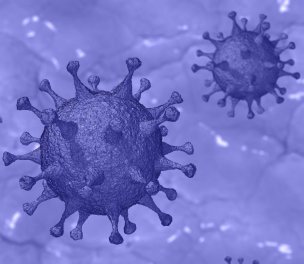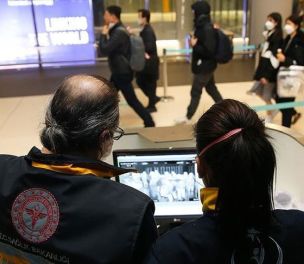Click to read the article in Turkish
Minister of Health Fahrettin Koca has announced that the South Africa and Brazil variants of coronavirus have been detected in Turkey.
Minister Koca has released a written statement following the weekly meeting of the Health Ministry's Coronavirus Science Board.
According to the statament, two citizens of Turkey contracted the South African variant of the coronavirus while one has contracted the Brazilian variant. Koca has added that 196 cases of the United Kingdom (UK) strain of the virus have also been detected in Turkey so far.
The patients have been isolated, Koca has added.
In the wake of rising cases once again, the measures against the pandemic will continue full throttle, Health Minister Koca has underlined, adding that the vaccination of citizens over the age of 65 and the second group will commence after safety tests are completed.
So far, 2.4 million people in the country have been vaccinated, with vaccination for those aged above 75 underway, he has noted.
Koca has also said that some of these variants spread fast, calling on citizens to adopt precautionary measures and avoid large gatherings.
In line with similar statements by President Erdoğan and Minister of National Education Ziya Selçuk, Health Minister Koca has indicated that face-to-face classes at schools in rural areas will start as of February 15.
Classes for grades 8 and 12 are expected to start in March depending on the course of the pandemic, he has underlined.
What do know about the new strains?
On the other side, a team of experts have spoken to the state-run Anadolu Agency (AA) and shared detailed information about the new strains.
Experts have warned against three new strains of the coronavirus from the United Kingdom (UK), South Africa and Brazil that now threaten the world due to their reportedly high rates of transmission.
Making a detailed assessment of the mutations, they have concluded that all three variants are likely to spread across the world in a short period.
As reported by the AA and described with an infographic as well, there are three variants detected in the world so far:
The United Kingdom (UK) variant
The UK variant, known in medical circles as the "variant of concern", was first detected in the second half of September last year.
It quickly spread to the south of England and became the dominant virus, especially in December, despite tight measures in place.
Also, the mortality rate of the mutated virus is higher. Studies have shown that it affects all age groups and its response to the vaccine is low.
The increasing number of cases has put pressure on the health system, leading to an increase in the number of seriously ill patients and deaths.
The mutated virus, which has spread to many countries, has increased its share in intra-community transmission, especially in Ireland and Portugal, as well as Switzerland and Denmark. There are concerns that the variant virus might become the dominant strain in mid-February.
South African variant
According to the assessment, the second variant, was detected during the second wave in South Africa in December 2020.
Initial studies showed that this variant might be resistant to neutralization by natural infection and post-vaccination antibodies.
The contagiousness of this coronavirus variant, which is now dominant in South Africa, has increased, but it has not yet been determined whether it causes a change in the course of the disease or not.
This variant, seen in "travel-related cases", has been detected in 31 countries so far. Some of these led to case clusters without travel history, especially in the United Kingdom (UK), France, and Israel.
Brazilian variant
The Brazilian variant coded as "P1" is common in the state of Amazonas. According to the assessment, herd immunity was reached for COVID-19 due to widespread infection in this region, but a sudden rise in cases and re-infections became a cause of concern.
Its ability to re-infect people who have already recovered from COVID-19 has puzzled doctors. The effects of the Brazilian variant on the course of the disease and mortality rates have not been determined yet. It was also detected in Japan and South Korea in people returning from Brazil. (EKN/SD)




.jpg)




